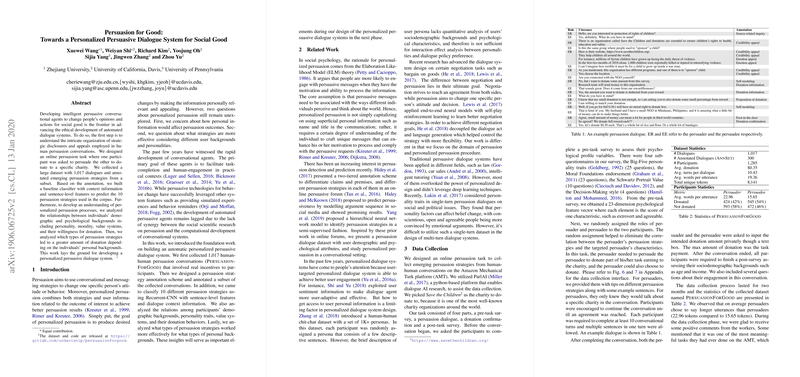Overview of "Persuasion for Good: Towards a Personalized Persuasive Dialogue System for Social Good"
The paper "Persuasion for Good: Towards a Personalized Persuasive Dialogue System for Social Good" is a comprehensive paper on developing persuasive dialogue systems aimed at promoting social good, specifically by encouraging individuals to donate to charitable causes. The research addresses the need for intelligent conversational agents that can personalize persuasive strategies based on user demographics and psychological profiles, thereby enhancing the effectiveness of persuasion in dialogues.
Contribution and Methodology
The authors designed an online task where participants engaged in text-based dialogues to persuade counterparts to donate to a charity, "Save the Children". They collected 1,017 dialogues, annotating a subset for various emerging persuasive strategies. The dataset not only encapsulates diverse persuasive tactics but also integrates demographic and psychological data, offering a multi-layered perspective on persuasion.
To classify these strategies, the authors developed a hybrid Recurrent-Convolutional Neural Network (RCNN) model incorporating sentence embeddings, context information, and sentence-level features. Notably, their system distinguished ten persuasion strategies, such as logical and emotional appeals, credibility, and foot-in-the-door techniques. This robust classification process is a foundational step towards automating personalized persuasion.
Findings
Key findings reveal that certain persuasion strategies, such as providing donation information, positively correlate with higher donation rates. Moreover, the effectiveness of persuasive tactics significantly varies with the persuadee's personal background. For instance, strategies like emotion appeal were more effective with extroverted individuals, demonstrating the importance of aligning persuasive strategies with psychological traits.
The paper also highlights the role of user demographics, such as age and decision-making style, in influencing donation outcomes. Older participants or those with a rational decision-making style showed a greater propensity to donate. This insight is crucial for tailoring persuasion strategies based on user profiles.
Implications and Future Directions
The research paves the way for more sophisticated, personalized persuasive systems that could revolutionize how AI interacts with humans in contexts requiring behavior change, such as health and environmental conservation. The integration of psychological and demographic data into the persuasion model exemplifies a forward-thinking approach that could significantly improve the efficacy of conversational agents.
Moving forward, the paper suggests enhancing the dialogue system by refining its ability to extract and process contextual information of conversations. Future research could extend this work by applying it to other domains where persuasion plays a critical role, ensuring the dialogue systems are ethically designed to support user autonomy and decision-making.
In conclusion, the paper provides a compelling case for the development of personalized persuasive dialogues, illustrating how nuanced, data-driven approaches can enhance the effectiveness of AI in promoting social good. The insights on the interaction between strategy efficacy and user traits are invaluable for practitioners aiming to leverage AI for behavior change interventions.
